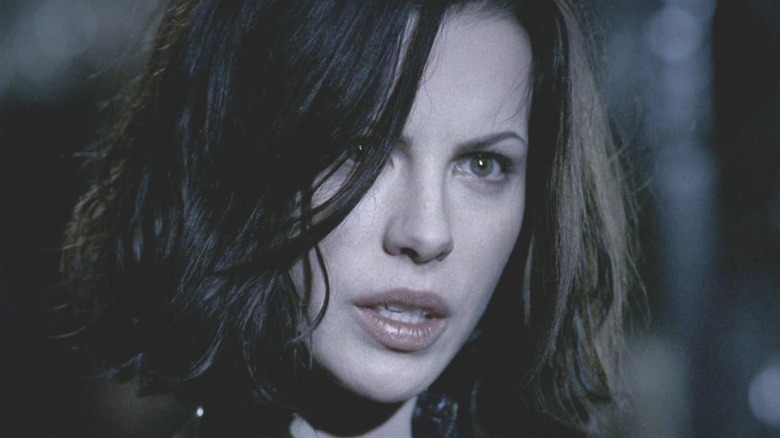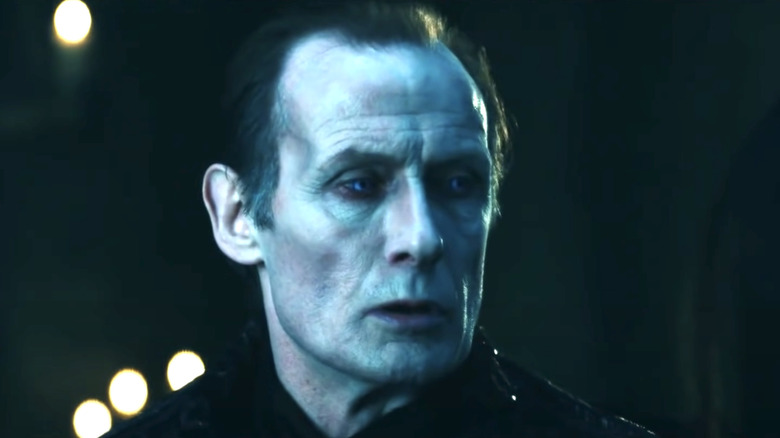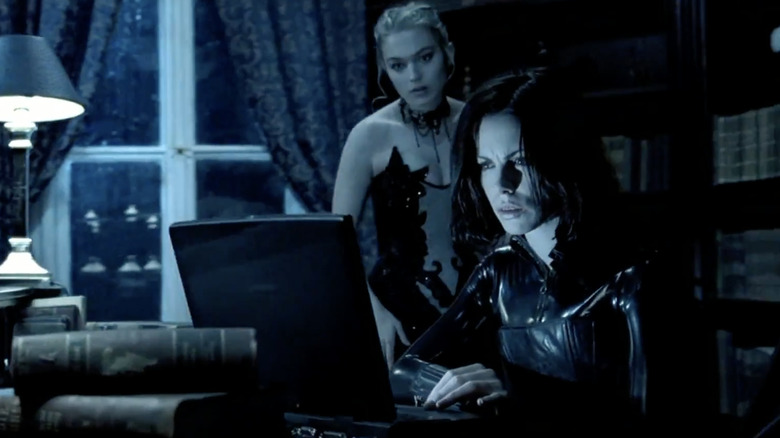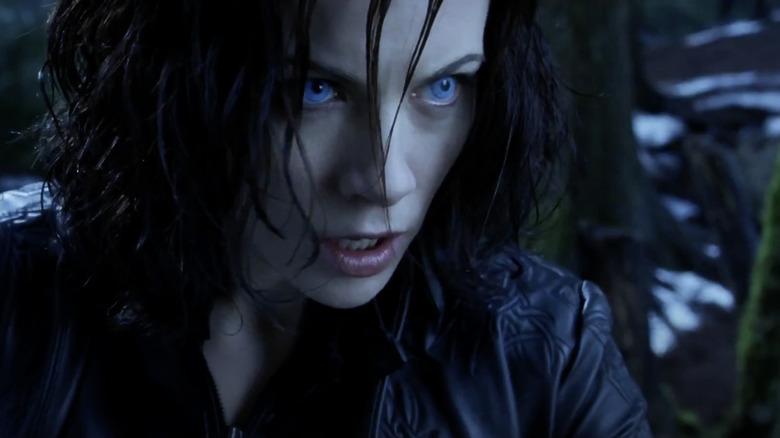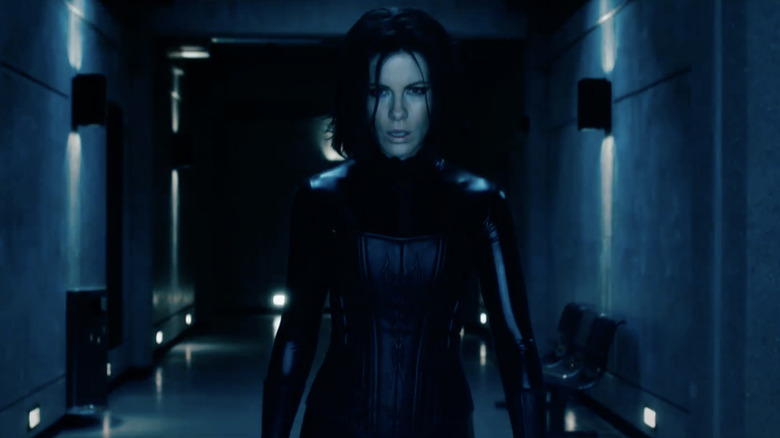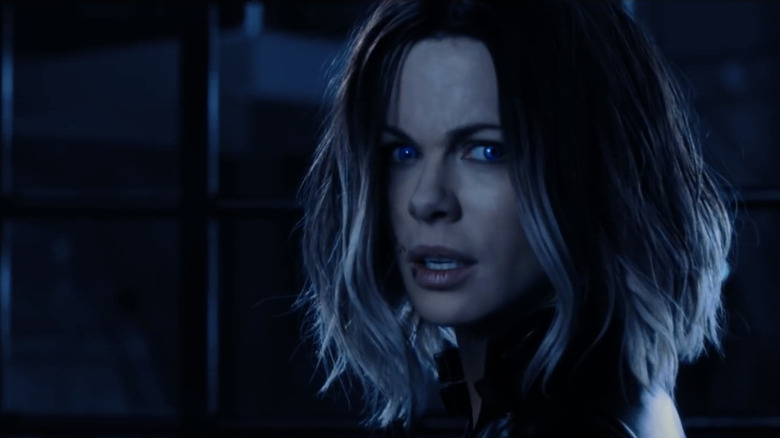The Correct Order In Which To Watch The Underworld Movies
When it was first released in 2003, not much was expected of the vampires vs. werewolves action flick "Underworld," if only because it featured no major on-screen talent and had no pre-existing fans. It was a bit of a surprise then that, in spite of those impediments and its negative critical reception (via Rotten Tomatoes), the film still found favor with moviegoers, who drove it to earn $95 million at the box office (via Box Office Mojo) during its theatrical run.
What's even more impressive is that "Underworld" proved to be so popular that the studio behind it promptly greenlit a sequel. The subsequent film ended up being an even bigger commercial hit (via Box Office Mojo), an achievement that understandably opened the door for a full-blown "Underworld" franchise to be made. That's exactly what ended up happening too, with the "Underworld" franchise producing a total of five feature films by the time everything was said and done.
The "Underworld" films were not, however, released in proper narrative order. With that in mind, if you're the sort of superfan who needs to experience the entire "Underworld" story in a chronologically accurate fashion, here is the correct order in which to watch the franchise's five movies.
Underworld: Rise of the Lycans is technically the first chapter in the saga
If you're looking to watch the "Underworld" franchise in chronological order, then you can't start with the first film released in the series. In fact, you're gonna have to begin your journey with 2009's "Underworld: Rise of the Lycans," which is the third installment in the franchise, but also a prequel to the 2003 original. The film saw O.G. "Underworld" helmer Len Wiseman (who also directed 2006's "Underworld: Evolution") handing the reigns over to first-time director Patrick Tatopolous, and it largely left series veterans like Scott Speedman and Kate Beckinsale out of the action (save for the latter's cameo in the film's final minutes).
As for the movie itself, it unfolds centuries before the events of "Underworld," and depicts the beginning of the ongoing war between the aristocratic vampire race (led by Bill Nighy's Viktor) and the Lycan race (led by Michael Sheen's Lucian) who had once been their slaves. In the middle of the conflict, an unexpected romance develops between Viktor's daughter Sonja (Rhona Mitra) and Lucian, which unsurprisingly ends in tragedy.
Some might say "Rise of the Lycans" is the film in which the franchise's overarching narrative gets a bit overcomplicated, but it's still a delightfully stylish, hyperviolent movie that easily carves out its place within the larger "Underworld" story.
The original Underworld is actually the second film chronogically
Once you've gotten the vampires vs. Lycans history lesson that is "Underworld: Rise of the Lycans" out of the way, it's time to dig into the original "Underworld" film. Set in modern times, this action flick takes more than a few cues from the similarly stylized "Matrix" films, but tries to offer a much different viewing experience by pitting vampire against werewolf instead of man against machine.
Directed with fevered energy by Len Wiseman and featuring a star-making turn from Kate Beckinsale, "Underworld" is largely successful in that endeavor — eschewing the philosophical questions asked by "The Matrix" in favor of more action-packed gunplay, eye-popping set pieces, and slow-motion posturing. In prioritizing style and action, "Underworld" undoubtedly falls short on narrative ingenuity, with Wiseman and company barely scratching the surface of the stark world the film so stylishly creates.
When a film looks as cool and plays as hard as "Underworld" does though, narrative originality isn't really the point. Unsurprisingly, viewers were inclined to cut the film a bit of slack as well, so long as they got to watch Beckinsale's dangerous vampire do what she does best: deal out some death.
Underworld: Evolution continues its predecessor's story
Most fans of the "Underworld" franchise might agree the original film is the best of the batch. Meanwhile, many would say the exact opposite about its direct sequel, 2006's "Underworld: Evolution." Indeed, critics did just that, with the film holding just a 17% Tomatometer score on Rotten Tomatoes – making it the lowest-rated installment of the "Underworld" franchise. But even if "Evolution" doesn't quite live up to its predecessor, it's still a solid continuation of the story that the "Underworld" team began in the original.
That story found Kate Beckinsale's icy, vampiric death dealer protecting Scott Speedman's Michael Corvin from certain doom while learning some hard truths about her species' troubled past. It also found Michael becoming the first of a new, beastly race — one that combines the strengths of both vampires and Lycans but features none of their weaknesses. In "Evolution," the duo spends much of the film on the run from both vampires and Lycans alike, as they try to make sense not only of everything they discovered in the first film but also of a trove of new information they uncover in the second. Notably, that includes the origins of both the vampires and the Lycans.
Selene and Michael also spend much of "Evolution" falling for each other (which complicates matters greatly in future films), before violently killing the biggest and baddest of their enemies when Selene gains some hybrid powers herself.
Underworld: Awakening is the fourth chapter in the monstrous franchise
While "Underworld: Evolution" concluded in a largely open-ended fashion, some would probably argue that it definitely didn't need a sequel. Nonetheless, "Evolution" brought in an impressive $111 million at the box office (via Box Office Mojo), and "Rise of the Lycans" fared similarly well, so one could hardly blame the franchise's producers for wanting to dip once more into the "Underworld" well. Considering that 2012's "Underworld: Awakening" performed even better at the box office, it's clear that, from a commercial standpoint, the series' producers were absolutely right to do just that too.
However, from a narrative standpoint, the "Underworld" franchise was already feeling a bit long in the tooth — so much so that neither Scott Speedman nor Len Wiseman returned for "Awakening." Thankfully, Beckinsale was back in action as Selene, leading a story that unfolds just a few years after "Evolution."
The film's story opens with the human race, now aware that both vampires and werewolves exist, hunting each species for the purpose of study and extermination. Selene survives the genocide in cryogenic sleep — waking up 12 years later to find Michael missing and both the vampire and Lycan races all but extinct. However, as she sets out to find Michael, she uncovers a vast conspiracy involving their daughter, Eve, which turns everything on its head and sets the stage for the series' bloody final chapter.
Underworld: Blood Wars brings an end to the series' story
After "Rise of the Lycans," the rest of the "Underworld" series actually does chronologically unfold in order of release. That, naturally, brings us to 2016's "Underworld: Blood Wars."
While we're all for making sure to end a series as beloved as "Underworld" in its own proper and satisfying way too, five films were arguably too many for this style-first franchise. That fact is reflected in the film's Rotten Tomatoes scores, which suggests that "Blood Wars" was, more or less, viewed as a disappointing closing installment by both "Underworld" fans and critics alike.
For those who missed "Blood Wars" in its theatrical run, the film opens in the immediate aftermath of "Awakening," with the Lycans on the verge of eliminating their vampire foes for good, and both races desperate to get their hands on Selene and Eve. The latter character, however, is already in hiding. Meanwhile, in her quest to find Michael and end the war for good, the film sees Selene step right into the middle of a fierce final battle between dueling vampire factions and a vicious Lycan horde.
Of course, there's a lot more going on between the lines in "Blood Wars," and if you're a die-hard fan of the "Underworld" series, you'll no doubt want to see how this film wraps things up.
